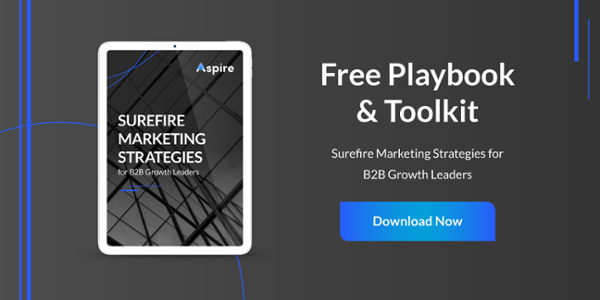- Inbound Marketing
- July 29, 2022
Why Selling Services to Attorneys is So Hard (and How to Make it Easier)

Aaron Marks

As a legal service provider, one of your most important buyers is attorneys. So, you know how hard it is to find, close, and win new business with them.
In fact, marketing and selling forensics or any other professional technology service to attorneys is very likely one of the hardest customers you could possibly sell to.
The difficulty selling to attorneys is primarily driven by 5 factors:
- Attorneys are very busy
- Attorneys have a gatekeeper / assistant to screen out sales and marketing
- Attorneys are highly digital today – and prefer to do research on their own when they have a need, before talking to sales
- Attorneys only buy when they have a need
- Attorneys are highly discerning and don’t trust things that aren’t technically precise and accurate
Many of these factors are true for any business that sells to other businesses. However, it’s the unique confluence of all five of these factors that makes selling to attorneys particularly difficult.
The good news is that overcoming these challenges is very possible. It just takes a deep understanding of these unique behaviors and the right ways to overcome them.
This blog post explains exactly how to mitigate each of these factors. If you can do this, you can be confident that you can attain at least one new, high-ticket attorney customer per month for your professional services business.
1. Attorneys are very busy.
Out of all the types of customers I’ve served in my career, few if any have been harder to reach than attorneys. The legal professional is notorious for the number of hours worked. And when your customer is so busy, it can feel impossible to reach them.
If you’re running ads, attending trade shows, making cold calls, and still not getting results – this probably explains why. Lawyers have less time than almost anyone else to give your brand any attention.
This is where inbound marketing comes into play. Inbound marketing is a business methodology that attracts customers by creating valuable content and experiences tailored to them. Whereas,
“Outbound marketing is a traditional method of marketing seeking to push messaging out to potential customers. Outbound marketing includes activities such as trade shows, seminar series, and cold calling. It is costly and the ROI is much lower than inbound marketing.” - HubSpot
Instead of expending all your energy trying to push your message on attorneys (outbound), you need to position your business to attract them and earn their trust (inbound). And in fact, this is reinforced by…
2. Attorneys have a gatekeeper / assistant to screen out sales and marketing.
To help manage their busyness, attorneys hire assistants, secretaries, and paralegals. For anything but the very smallest firms, these are always going to exist.
And of course, there are lots of companies that want to sell their services to attorneys and their firms. So, you better believe that these assistants are masterful at gatekeeping. If what you’re offering doesn’t solve an immediate problem, you’re not getting through.
Cold calling? “Sorry, Mr. Schwartz isn’t available right now.” Cold emailing? The assistant is going to hit the ‘spam’ button. Ads? The assistant is going to avoid them, and only go directly to the information the attorney needs at that moment.
In other words, if your efforts are all outbound, you’ll be left sending thousands of emails and making hundreds of calls to speak to a single lawyer.
This is why it’s so crucial to have marketing in place that earns these prospects’ trust. And equally importantly, this is why it’s important to implement a successful Referral Marketing program. If you’re able to identify your most satisfied customers, and earn referral business from them, you can avoid the gatekeeper and get directly to the attorney.
3. Attorneys are highly digital today – and prefer to do research on their own when they have a need, before talking to sales.
Among all B2B buyers, 67% of research is done digitally – i.e., without wanting to talk to sales. In my experience, this number is even higher with attorneys! After all, lawyers are smart, well-educated people who prefer to solve problems on their own.
This is why having a strong online marketing presence is absolutely essential. If your website doesn’t get found when attorneys are doing that research, you have virtually no chance of winning their business.
But getting found is one thing – and it’s not enough. If you don’t have the content and materials to help attorneys do their research, you probably still aren’t winning their business!
Think about an attorney who’s seeking, let’s say, legal graphics. Odds are, they don’t just wake up one day and decide they’re going to buy from Vendor A. Instead, they probably start by wondering, “What types of legal visuals are available?” If they’re like many people these days, they might turn to Google to search for that exact question. And whichever vendor they find that can answer that question, will earn some trust (and an increased likelihood that the attorney will buy from them when the time comes).
With that answer, the attorney may now wonder, “How do I ensure my animation is admissible?”, or “How much does an animation cost?”. Now that they have found a trusted resource that answered their first question, they will probably turn to that same resource to answer further questions. And if that vendor / resource can answer all their questions, odds are quite high that they will purchase from the same vendor!
This explains why content marketing is so crucial. From having helpful blog posts to answer simple questions like these, to having detailed eBooks and whitepapers to address more complex questions. If you have helpful content on your website, you can enable lawyers throughout their research, and then odds are they will choose to buy from you.
Plus, if your content is created strategically, it will add SEO value that will help you ensure your business gets found on Google by your prospective customers.
4. Attorneys only buy when they have a need.
This is one of the toughest parts of selling to attorneys. Research from the B2B Institute has uncovered that 95% of buyers are not looking for what you sell at any given time.
And hearkening back to point #1, if attorneys aren’t looking for what you’re selling, they’re going to be too busy to care. Or worse, if you keep trying to sell your offering to attorneys when they don’t need it, they (or their assistant) will likely start to ignore your company – making it way less likely you’ll be able to sell to them when they finally do need your product!
This is why investing in a CRM and marketing automation solution is so important. You need to be able to identify where your prospects are in their research process, and then deliver them the “right message, at the right place, at the right time.” And, you need to be able to stay top of mind, so that when your buyer is ready to buy, you are the brand they think of.
For example, if you have a prospect who has just started researching for the future, you will want to look at putting them into some sort of nurture stream that sends periodic emails with educational and helpful content.
On the other hand, if your lawyer prospect is spending a lot of time on your website, you need to know that, too, so you can become more aggressive with your outreach. Even then, your content marketing is going to be critical as well. Sending a case study that proves what you can do is probably going to be much more effective than cold emails trying to convince them to buy from you.
5. Attorneys are highly discerning and don’t trust things that aren’t technically precise and accurate.
This explains why a lot of firms that sell to attorneys invest in marketing but see no results. In some industries, it’s incredibly easy to create content, send emails, and publish to social media. But with attorneys, you can’t put materials out there that are half-baked.
Your marketing team needs to be able to speak and understand nuanced legal terms, like the difference between mediation and trial (and the difference in solutions an attorney needs for each). The content they write and publish needs to be highly precise and accurate – it needs to put a great first foot forward for your company.
In short, everything your marketing team does needs to be rooted in understanding the customer and their expectations. This starts with developing robust buyer personas, and including all key stakeholders (not just marketing) in the process. And moving forward, it requires marketers who can be simultaneously experts at marketing while creating accurate and relevant content.
Selling to Attorneys is Difficult – But Not Impossible
Marketing and selling to attorneys are particularly difficult because of these five factors. While many B2B customers embody 3 or 4 of these traits, attorneys are uniquely challenging because all five of these factors are so strong.
The key to overcoming these is to build an inbound marketing engine that earns the interest of attorneys, and provides helpful and useful information throughout their research process. Once you’ve done that, the next step is to ensure you understand where all of your prospects are in their research, and that you can custom-tailor your marketing to them based on this. And to enable all of this, you need a marketing team that understands the customer and knows how to sell to them.
Does it all still feel a little overwhelming? That’s where Aspire can help! Our team has specialized experience marketing to legal professionals in complex, high-ticket verticals like forensic services. We use our proven Forensics Framework to build a marketing plan to reach your target lawyers, and then our specialized team executes the plan for you.
Book a free Marketing Assessment to meet with an expert who will offer you practical suggestions you can implement today.
Aaron Marks is the Chief Marketing Officer of Execo. A digital pioneer with nearly two decades of online marketing experience, Aaron has helped organizations ranging from fledgling startups to Fortune 500 enterprises, and global manufacturers to U.S. Presidential campaigns, get the marketing and business results they needed.



0 Comments